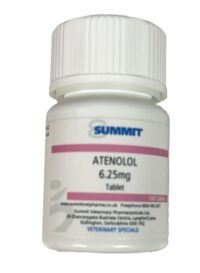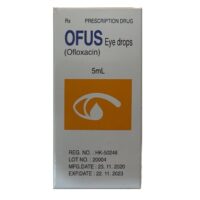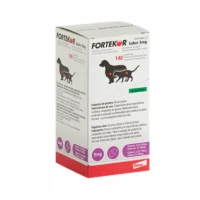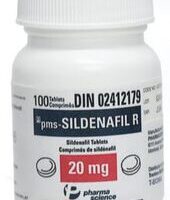描述
- 用於: 治療室上性快速心律不整、心室早搏及全身性心搏過速
一般說明
阿替洛爾是一種β受體阻斷劑,用於治療高血壓和快速心律不整(心率過快伴隨節律異常)。對於已經患有心臟衰竭的患者應謹慎使用阿替洛爾。
用途
β-受體阻斷劑治療高血壓和快速心律不整
怎麼運作的
阿替洛爾是一種特定的β1受體阻斷劑,會造成心血管影響。
劑量
請注意:對於所有獸醫物種,劑量是額外標籤(未經 FDA 批准) 狗:每公斤體重 0.25-1 毫克,每 12 小時口服一次。
**貓:**每隻貓每 12 小時口服 6.25 毫克,據報道,每隻貓每天兩次的劑量高達 25 毫克。對於腎功能不全的貓,建議調整劑量。 雪貂: 肥厚型心肌病變,每隻雪貂口服 3.13-6.25 毫克,每日一次
形式
口服錠劑:25毫克、50毫克和100毫克
儲存資訊和處理
1-阻斷劑引起心血管影響 儲存資訊/處理: 片劑:在室溫下儲存,避熱、避光及防潮。
我可以期待什麼結果?
透過適當的劑量,血壓升高和心律不整應該可以緩解或顯著改善。
錯過劑量
如果錯過一劑,請在預定時間繼續下一劑。
過量/急性毒性:
過量服用可導致低血壓、心搏過緩、低血糖、高血鉀和心臟衰竭。如果懷疑服用過量,請立即尋求獸醫護理。治療可能包括誘導嘔吐和使用活性碳吸收到達腸道的藥物。將監測血壓、心電圖、血糖和鉀水平。治療是根據需要透過液體療法和藥物對心臟功能和血壓進行症狀支持。
副作用
- 低血壓(不常見)
- 心搏過緩(罕見)
- 嗜睡(罕見)
- 食慾不振(不常見)
- 支氣管收縮(不常見)
- 狗暈厥(罕見)
禁忌症
- 心臟衰竭
- 對β受體阻斷劑過敏
- 竇性心搏過緩
- 支氣管痙攣性肺病
- 患有慢性疾病的患者慎用
藥物交互作用
阿替洛爾與麻醉藥物一起使用時應謹慎,因為它可能會導致心肌抑制。阿替洛爾與鈣通道阻斷劑及β受體阻斷劑同時使用時應謹慎。阿替洛爾可能會加劇可樂定治療後的高血壓反彈。阿替洛爾可能與任何其他也可引起低血壓的藥物(如呋塞米、肼屈嗪、吩噻嗪藥物或利血平)一起產生額外的降血壓作用。β-受體阻斷劑,例如阿替洛爾,可能會阻斷擬交感神經藥,例如特布他林、腎上腺素、苯丙醇胺的作用,從而降低阿替洛爾的功效。
預防
患有明顯心臟衰竭、支氣管痙攣性肺病或腎功能不全的患者應謹慎使用阿替洛爾。
實驗室注意事項
高劑量時,阿替洛爾可引起低血糖或高血糖,糖尿病患者應謹慎使用。
- Used for: Treatment of supraventricular tachyarrhythmias, premature ventricular contractions, and systemic hyp
General description
Atenolol is a beta-blocker used to treat hypertension (high blood pressure) and tachyarrhythmias (rapid heart rate with an abnormal rhythm). Atenolol should be used cautiously in patients already in heart failure.
Uses
Beta-blocker to treat hypertension & tachyarrhythmias
How it works
Atenolol is a specific beta1-blocker causing cardiovascular effects.
Dosage
Please note: dosing is extra label (non-FDA approved) for all veterinary species Dogs: 0.25-1 milligram per kilogram of body weight by mouth every 12 hours.
**Cats: **6.25 milligram per cat by mouth every 12 hours, dosages as high as 25 milligram per cat twice daily have been reported. Dose adjustments are recommended in cats with renal dysfunction. Ferrets: for hypertrophic cardiomyopathy 3.13-6.25 mg per ferret by mouth once daily
Forms
Oral tablets: 25mg, 50mg and 100mg
Storage information & handling
1-blocker causing cardiovascular effects Storage information / handling: Tablets: store at room temperature, protect from heat, light and moisture.
What results can I expect?
Elevations in blood pressure and abnormal heart rhythms should resolve or improve significantly with an appropriate dose.
Missed dosage
If a dose is missed, continue with the next dosage at the scheduled time.
Overdose / acute toxicity:
Overdoses can lead to hypotension, bradycardia, hypoglycemia, hyperkalemia and heart failure. If an overdose is suspected, seek veterinary care immediately. Treatment will likely include induction of vomiting and administration of activated charcoal to absorb the medication that has reached the intestines. Monitoring of blood pressure, ECG, blood glucose and potassium levels will be performed. Treatment is symptomatic support of cardiac function and blood pressure via fluid therapy and medications, as needed.
Side effects
- Hypotension (uncommon)
- Bradycardia (uncommon)
- Lethargy (uncommon)
- Inappetence (uncommon)
- Bronchoconstriction (uncommon)
- Syncope in dogs (rare)
Contraindications
- Heart failure
- Hypersensitivity to beta-blockers
- Sinus bradycardia
- Bronchospastic lung disease
- Use with caution in patients with pre-existing chronic diseases
Drug interactions
Atenolol should be used cautiously with anesthetic medications as it may cause myocardial depression. Concurrent use of atenolol with calcium channel blockers and beta-blockers should be approached with caution. Atenolol may intensify rebound hypertension after clonidine therapy. Atenolol may have additive hypotensive effects with any other drugs that can also cause hypotension such as furosemide, hydralazine, phenothiazine drugs, or reserpine. Beta-blockers, such as atenolol, may block actions of sympathomimetics such as terbutaline, epinephrine, phenylpropanolamine, subsequently decreasing the efficacy of atenolol.
Precaution
Atenolol should be used cautiously in patients with overt heart failure, bronchospastic lung disease or renal insufficiency.
Laboratory considerations
At high doses, atenolol can cause hypoglycemia or hyperglycemia, and should be used cautiously in diabetic patients.




